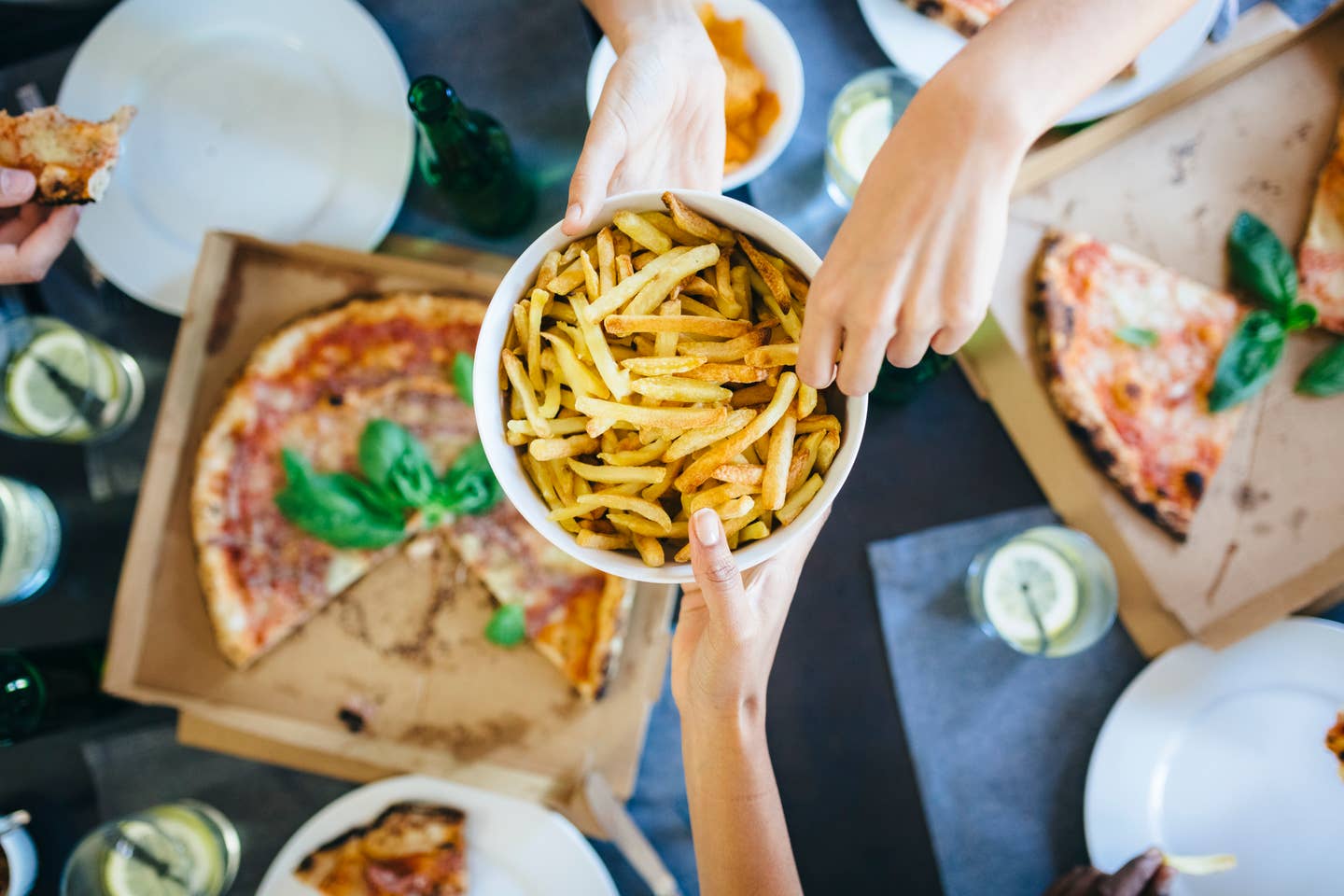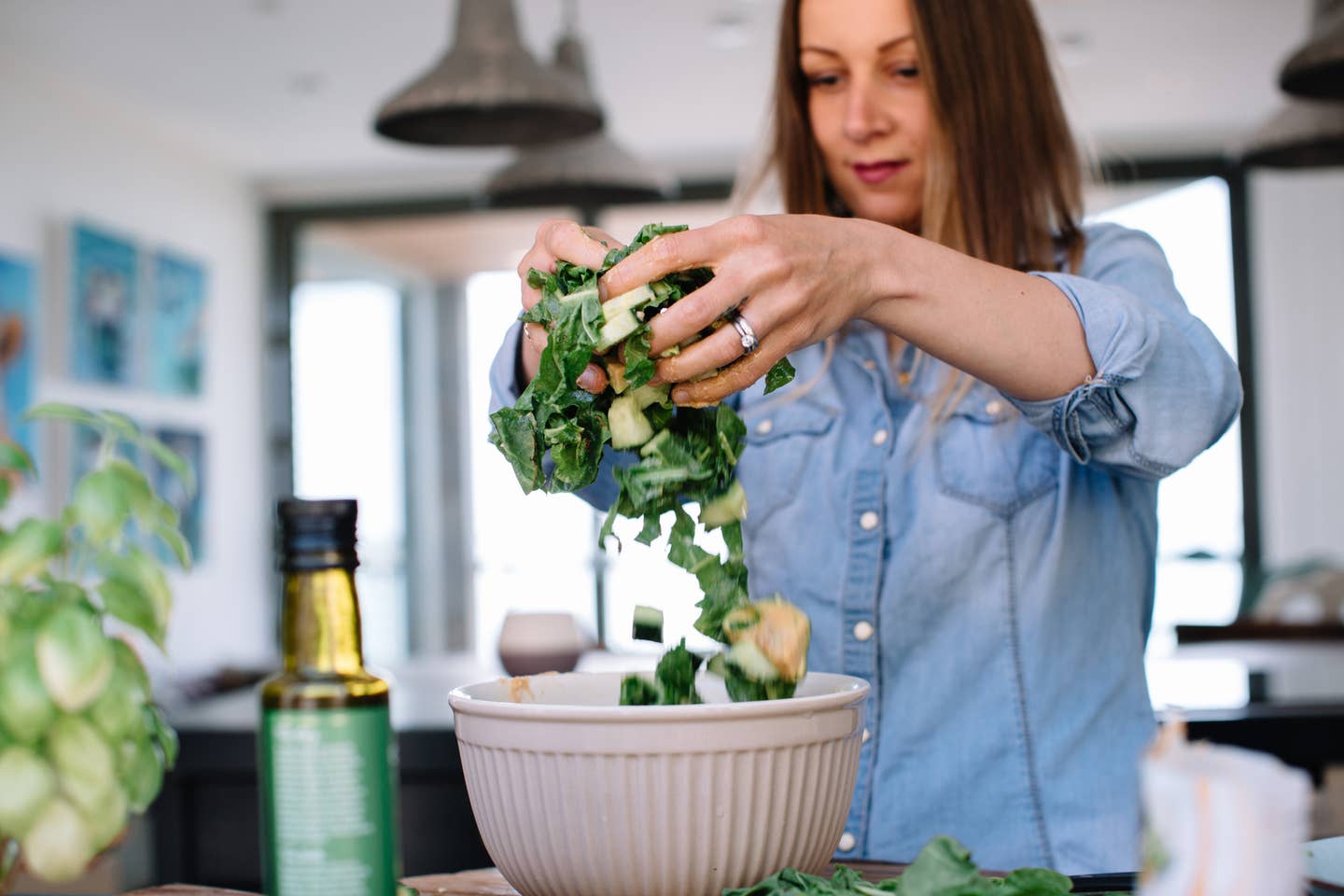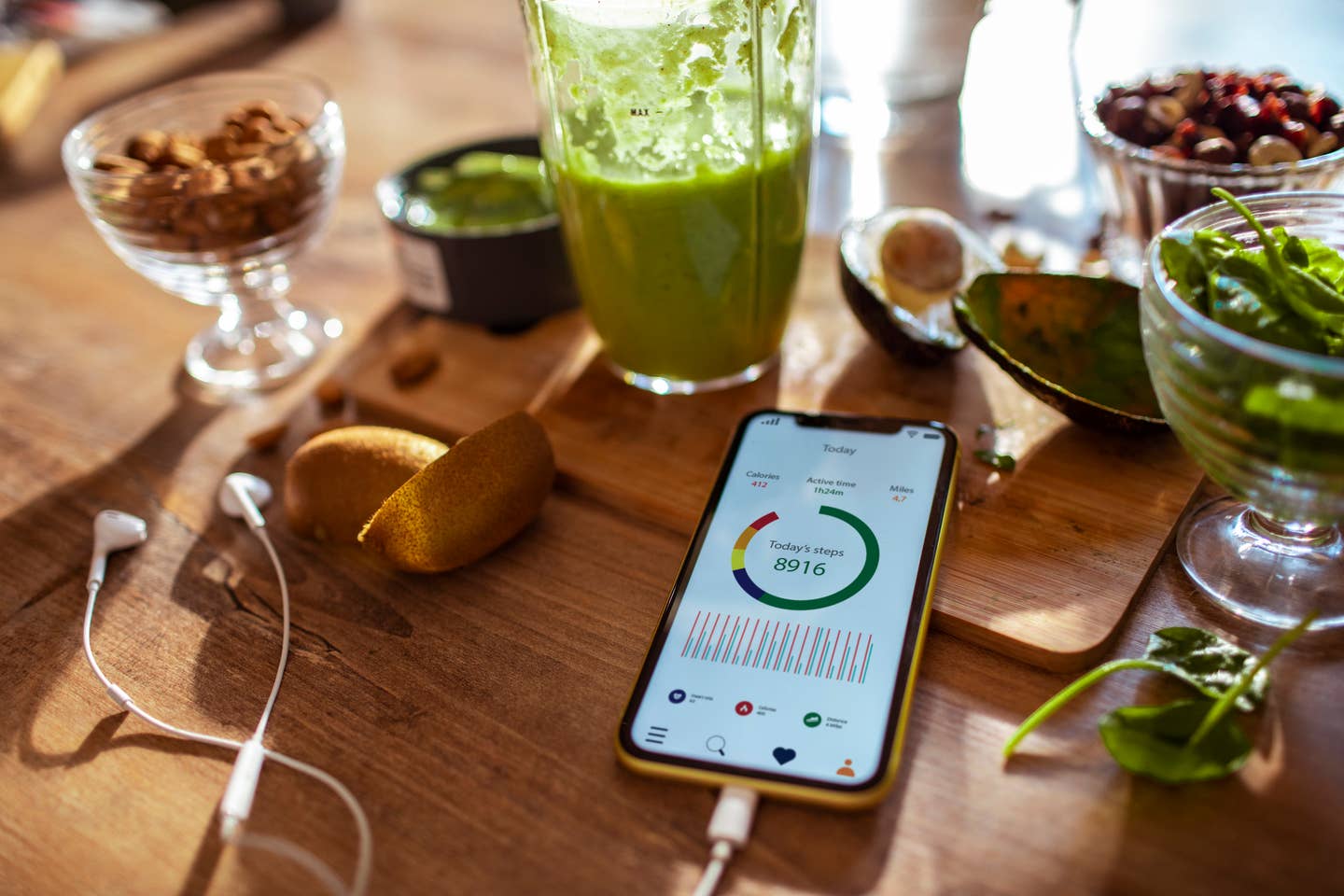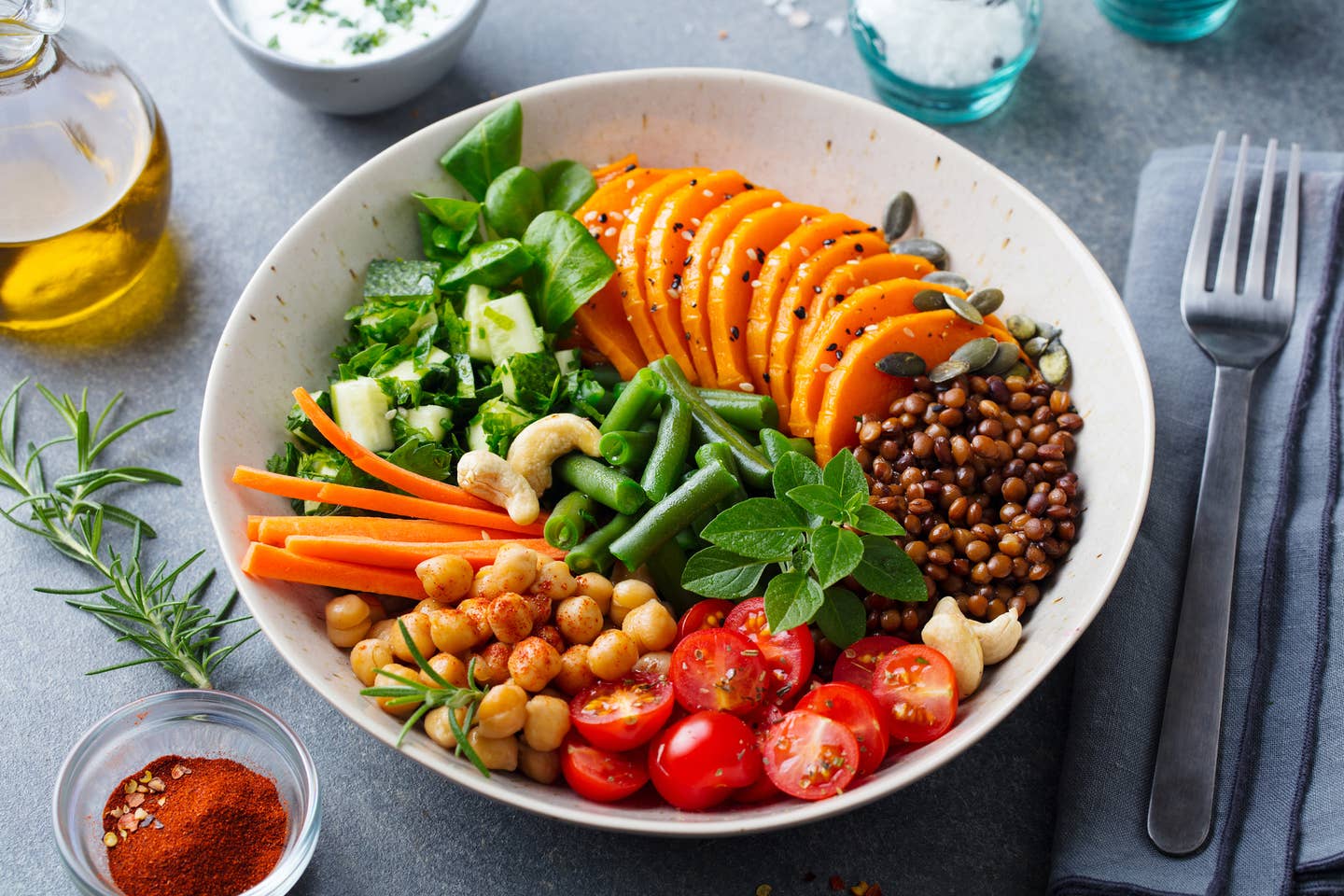
If You Tried Going Vegan and Actually Gained Weight, This Might Be Why
Here’s something you may have heard or experienced: “I went vegan and gained weight.” Many people equate vegan or plant-based eating with healthy weight loss. Unfortunately, that’s a fallacy. If weight loss is your motivation for going plant-based (or the desired by-product of choosing to ditch animal products such as dairy), you can shed pounds, but the types of vegan foods you eat matter.
Before going into some tips to help your weight-loss goals succeed, let’s take a moment to recall the incredible health benefits when you go plant-based and start eating more plant foods and leave animal products behind.
A Plant-Based Diet Lowers Your Risk of Disease and Death
A diet high in plant-based foods like vegetables, fruits, nuts, seeds, and whole grains and low in animal fat has been associated with a lower lifetime risk of heart disease, obesity, type 2 diabetes, strokes, and certain cancers, especially hormonal ones like breast and prostate. (This may be due in part to the estrogen that passes from the cow to cheese to our bodies according to the work of Dr. Neal Barnard, founder of Physicians Committee on Responsible Medicine, which has petitioned the FDA to add warning labels to cheese.) In one study on the health benefits of plant-based eating, the researchers found that there is an association with lowering your risk of premature death from all causes when you give up meat and dairy. You also need to stay away from processed or junk food to protect yourself from disease risk, so while you're skipping dairy, drop the bag of greasy chips.
Going Plant-Based Is Better for the Planet
Next, animal agriculture is a leading cause of greenhouse gas emissions (which is a considerable factor in climate change). Many organizations like the United Nations Environment Program (UNEP) and the National Academy of Sciences have backed up this claim. A study from Oxford University determined that going vegan is the most influential way to help fight climate change. Also, at the core of veganism is animal compassion. Modern-day farming (factory farming or intensive farming) has created some of the worst, systematic exploitation of animals in our history. You can feel good and even be motivated by the fact that you are not supporting that industry.
So Why Are You Not Losing Weight On a Vegan Diet?
Generally, a vegan diet is devoid of animal products, but a plant-based diet adds more fruit and vegetables to your daily intake and includes healthy whole grains, nuts, seeds, and especially legumes which are high in protein and fiber. So one possibility is that you are not eating "healthy" vegan foods, since it's easy to fill up on empty-calorie vegan junk foods (Twizzlers or chips for instance) that may be free of animal products but are also completely devoid of nutrients and filling fiber.
First, look at what kind of plant-based foods you are eating. If you’re filling up on heavy, calorie-dense foods (pasta, burgers, pizzas, processed snacks, or sweets), just because they are vegan, does not mean you can eat “more,” or endless amounts instead of thinking: I need to avoid all animal products, start thinking: I need to get as many nutrients in every bite that I possibly can. A general rule would be to focus on eating a whole foods plant-based (WFBP) diet as much as possible. This means choosing items free of added sugar, and cooking with as little oil as you can since oil is calorie-dense and can add up. (The Beet’s expert, Natalie Rizzo, RD, provides a great guide to starting to eat WFPB here.)
"Whole foods plant-based diets are great for weight loss because they are naturally low in calories, and saturated fat while being high in vitamins, minerals, and fiber,” says David Sonenberg, a Registered Dietitian and a Certified Diabetes Care and Education Specialist.
Below, we highlight some of those sneaky foods that might be loading you up with extra calories. Plus, we offer some great foundational tips for healthy and happy weight loss.
1. Avoid fried foods and oils
An easy rule to follow and eliminate empty calories is to simply not eat fried foods. Always opt for items prepared grilled or steamed—or even better try an air fryer. Another calorie-dense food that can sneak up on you is oil; in just one tablespoon is 120 calories. When you are cooking yourself, use vegetable broth or other oil substitutes. When eating out, ask for foods to be cooked with no oil, or opt for foods that wouldn't require them. Also, be mindful of margarine and plant-based butter portioning; they are certainly delicious but can certainly add up.
2. Ditch the high-fat foods and snacks
There are certainly benefits of healthy-fat foods like avocado and nuts, which are whole foods. But consuming these in large quantities can pack in a lot of extra calories. Fats contain 9 calories per gram. Carbs and protein generally only contain 4 calories per gram. This means high-fat foods are more calorie-dense. They can also easily be over-consumed. For example, 10 raw almonds contain 78 calories; while this is a great healthy snack when portion-controlled, over-snacking on these and the calories can quickly add up! Swap those high-fat snacks for lower-calorie items like lupini beans for example. (We have an entire guide to whole food healthy snacks for weight loss: here.) Sonenberg also notes that keeping snacks or tempting foods out of sight can help prevent overeating and excess snacking. “For the greatest success remove distractions from mealtime like eating in the car, in front of TVs, phones, and computers. When eating, focus on the flavors of the food, and how they affect your level of hunger."
3. Use dressings and sauces in moderation
Wow. How delicious those, rich, creamy vegan dressings and sauces are these days. But, a creamy dressing, for example, can easily turn a light lunch salad or dinner starter salad into a calorie-heavy endeavor. Always ask for the dressings on the side, and only use half the serving. Or, use a little balsamic vinegar or lemon juice instead. The same goes for vegan mayo or other creamy sauces that you might add to a veggie burger. Mustard is typically only 10 calories per tablespoon. And ketchup is about 20 calories per tablespoon, much less than a vegan ranch or “cream” sauce.
4. Keep an eye on alcohol consumption and choose a low-cal option
Maybe you have thought that a lighter dinner means you can double up on drinks. But regardless of what you are eating, be mindful of how much alcohol—and what kind—you are drinking. If you’re out having cocktails, don’t be shy to ask for modifications, like leaving the agave out of a margarita. Or, do a simple mixed drink like a vodka soda (and if that’s too boring add just a splash of grapefruit or pineapple juice). On the beer front, there are some great tasting options for around 100 calories (that are not the typical light beers). For example, there’s the tasteful Ballast Point Lager (99 calories) and Guinness (surprisingly only 125 calories per bottle). Also, hard kombucha is a better-for-you alcohol growing in popularity with transparent labels and ingredients—you can find many for under 100 calories per can. Drinking can also loosen inhibitions and lead to poor food choices. So, do your research before going out or buying booze for a party. A low-calorie beverage here and there is not going to put a dent in your weight loss.
5. Assess your activity level and up your NEAT
While what you eat is important (and a very critical factor when it comes to weight loss) your activity level can help or hinder your weight loss and health goals. Plus, activity is important for heart health, endorphin release, and mood balance for general healthy living. You don’t need to do high-intensity training to see the benefits. Try a long power walk or some lightweight training. You can also maximize your non-exercise activity thermogenesis (NEAT) which is simply the energy expended for everything you do that is not sleeping, eating, or sports-related exercise like playing with the dog, cleaning the house, etc. Give your NEAT an upgrade by taking the stairs (rather than the elevator) or parking at the end of the parking lot to get extra steps in. These NEAT calories add up and can help burn extra calories throughout the day.
Finally, remember weight loss, no matter what sort of plan you are on, takes time. And, there is no hard-fast rule about when you will see results since everyone's body is different. For people with a lower body mass index, you likely have less weight to lose so it will often come off slower (one to two pounds per week).
I am going to embark on trying a strictly whole food plant plan for a week to see what happens. While I do eat all plant-based on a regular basis, I certainly often splurge on a fair amount of processed vegan foods. And for me, the temptation is sweets (There are so many delicious vegan ones these days!) So going WFPB seems like a perfect way to reset to really focus on whole foods, and maybe learn to love fruits as a sweet fix! Maybe I’ll shed a few pounds, have more energy, less mental fog, and all the other benefits people report. But let’s see what happens and if and how my body (and mind) changes.
Our expert source and reviewer for this article was David Sonenberg. Sonenberg holds a Master's of Science in nutrition, is a Registered Dietitian, and a Certified Diabetes Care and Education Specialist. He works at a cardiology practice in New Jersey helping patients overcome chronic illness through changes in diet.
More From The Beet






